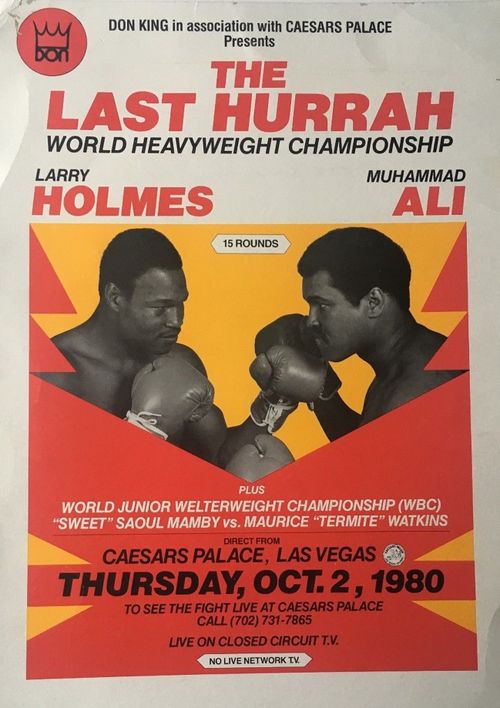On its 40th anniversary, Mark Baldwin looks back at one of the grimmest spectacles in boxing history – when a peak Larry Holmes dismantled the shadow of a once great Muhammad Ali.
Muhammad Ali had a career of pulling off miracles inside a boxing ring. Not only wasn’t he expected to beat Sonny Liston and George Foreman, but there were also genuine fears for his health in those historic fights.
Ali had shocked the world before, but even he couldn’t defy age and years of erosion. The signs of decay had been visible for quite some time.
Retirement should have come after his near-death experience in Manila in 1975. The third fight with Joe Frazier was arguably the most brutal and savage fight in history. Both men should have retired on the spot, neither fighter was ever the same again in more ways than one.
Fighters have their time, they all probably know when it’s over, but very few admit it. Ali always wanted more, but slowly and surely he was fading right before our eyes. Not just as the phenomenal athlete he once was, but you could also see the decline outside of the ring.
The punches that once were a blur, became slow and ponderous. Words that once flowed with venom and humour were now delivered much slower and quieter. A sport that gave him so much had inevitably taken much more.
An historic win over Leon Spinks in 1978 saw Ali finally retire. But it was a temporary parting of the ways. In 1980, an old hired hand was now the WBC heavyweight champion of the world.
Larry Holmes, unbeaten in 35 fights and in his physical prime, was the target for more history. With reportedly dwindling finances, a few more millions no doubt added to Ali’s temptation to return.

Ali removed the excess weight he had accumulated in retirement, 256 pounds became 217, his lightest since Zaire. The grey was covered up; looking in the mirror he saw his youth, ignoring the pain from within. No amount of superficial coating could hide the painful truth. Worrying pre-fight medicals were either ignored or worked around.
Ali tried to deceive us into believing he had a chance to win; in reality, he was dangerously deceiving himself.
Prescribed tablets for a suspected thyroid condition were abused, further restricting Ali in his quest for even more history. Ali was showing serious signs of fatigue and sluggishness in the final weeks of training. An already severely ageing fighter suddenly got even older.
A fighter rapidly deteriorating, Ali had no business fighting anyone let alone someone anywhere near the level of Larry Holmes. No benefit of hindsight was needed.
Ali said he knew in the first round he wouldn’t win, most of us knew far sooner and I suspect Ali did also.
Ferdie Pacheco the long-time physician of Ali said, “It was a crime the fight was allowed to happen,” he wasn’t far wrong. Ali had his pride, but nothing else, nothing. Holmes gave him a fearful, horrible beating. The famous Ali shuffle was replaced by just a slow, painful shuffle. Even getting into that ring in Las Vegas, seemed to drain what strength he had left in his tired old body.
Only sporadic signs of life from Ali broke the pattern of Holmes just hitting him at will. Pitiful efforts of attack were brushed aside with ease and contempt as Holmes battered the former champion with sickening long-lasting shots to head and body. Ali still had his pride and immense courage, but little else.
It was an awful, shocking spectacle, maybe even more so now. A once-great fighter reduced to the role of a punching bag. Joe Louis losing to Rocky Marciano in 1951 was bad, this was worse, much worse.
Every punch Ali absorbed from Holmes, never left his body for the rest of his life. Almost certainly any chance of a normal healthy life for Ali ended in that ring. A fight that didn’t need to happen, it shouldn’t have happened.
Holmes showed some degree of mercy, certainly far more than those who let Ali fight again. Too many people failed in their duty of care.
The onslaught ended after 10 one-sided rounds. Stopped too late, it shouldn’t even have started. Ali needed protecting from himself. An old relic wheeled out for a prolonged public beating.
Holmes said post-fight that, ‘He did what he had to do’ but he simply shouldn’t have had to do it. That should have been enough, but we had to endure more of the same. Ali returned one last time, Trevor Berbick outpointed him over 10 rounds in a farcical life-sucking spectacle in the Bahamas in 1981. Finally, at 39, Ali called time on his fabulous career.
Everyone involved in this whole sorry episode should hang their heads in shame. Everything that is wrong with boxing laid bare right before our eyes. The fight doesn’t need a commentary, no words are needed to describe what we saw in that ring. It was butchery which was camouflaged as sport, but we all saw it for what it was.
Sylvester Stallone later remarked that the fight was, “Like watching an autopsy on a man who’s still alive.”